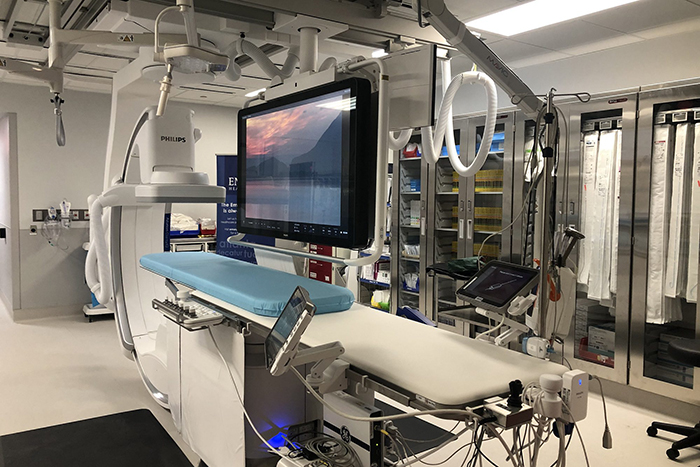More than Surgery
Because your blood vessels span your entire body, vascular surgeons treat a wide variety of conditions. Patients might visit for varicose vein treatment, surgery to treat an aortic aneurysm, or to clear blockages in the carotid artery. A vascular surgeon might also make a fistula for a patient, creating the connection point they use to filter their blood during dialysis.
 Leg complaints, like swelling, pain, or dilated veins, are the most common reason a patient might see a vascular surgeon, Dr. Khan says. Patients might also need repair of their artery walls after an aneurysm, or treatment after they’ve had a stroke. “About 60 to 70% of the problems we deal with are outpatient procedures, and a patient can go home the same day,” he says.
Leg complaints, like swelling, pain, or dilated veins, are the most common reason a patient might see a vascular surgeon, Dr. Khan says. Patients might also need repair of their artery walls after an aneurysm, or treatment after they’ve had a stroke. “About 60 to 70% of the problems we deal with are outpatient procedures, and a patient can go home the same day,” he says.
Vascular surgeons can perform a wide variety of surgeries, which can range from those requiring long incisions and open surgery to minimally-invasive operations, which are performed through a space the size of a pinhole. However, many vascular problems can be treated through lifestyle changes, medications, or other conservative treatments, so surgery isn’t a vascular surgeon’s first recommendation.
Investments in Vascular Care
Recent and upcoming expansions to vascular surgery mean that even the most challenging cases receive full-service care, and patients can be treated without requiring a transfer to other facilities. Investments include:
- Vascular Labs and Ultrasound: Vascular ultrasound is a non-invasive procedure that vascular surgeons are specially trained in to identify disease in their patients. With new office-based vascular labs, patients can discuss their condition with a surgeon, receive an ultrasound and make a plan with their doctor all in the same appointment. In addition, both hospitals have new, updated ultrasound equipment.
- Vein Centers: The two hospitals have also added a robust outpatient practice that treats varicose veins and other vein issues, often in as little as 30 minutes. The surgeons perform an ultrasound to understand and resolve the underlying cause so that they can address aesthetic concerns and painful symptoms effectively, safely, and at the same time.
 Hybrid Surgical Suites: Hybrid surgical suites are in development at both Emory Decatur Hospital and Emory Hillandale Hospital and will open in the spring of 2023. These suites are fully-equipped operating rooms that also include sophisticated imaging equipment, explains Dr. Badrinathan. Here, surgeons use less invasive procedures first and can switch to a traditional surgery if necessary. This means the surgeons can help a patient in just one session, rather than scheduling a follow-up surgery days later. “This will minimize operative time and minimize a patient’s recovery time while providing very similar results,” says Dr. Khan.
Hybrid Surgical Suites: Hybrid surgical suites are in development at both Emory Decatur Hospital and Emory Hillandale Hospital and will open in the spring of 2023. These suites are fully-equipped operating rooms that also include sophisticated imaging equipment, explains Dr. Badrinathan. Here, surgeons use less invasive procedures first and can switch to a traditional surgery if necessary. This means the surgeons can help a patient in just one session, rather than scheduling a follow-up surgery days later. “This will minimize operative time and minimize a patient’s recovery time while providing very similar results,” says Dr. Khan.
Advanced Techniques
The field of vascular surgery has evolved tremendously over the last 15 years, says Dr. Khan, and the surgeons are committed to adopting new, innovative techniques to enhance their care. “Every six months, there is a new and better way of fixing the problem.” Constant innovation means finding less invasive, more efficient ways to treat patients and achieve the same or better results.
Endovascular surgery is one kind of minimally-invasive technique that can keep a patient from spending several days in a hospital. In this procedure, patients feel a needle stick in their groin, and surgeons can identify issues using an X-ray and fix it with a balloon or stents. “Ninety-nine percent of patients will go home that day, and they can walk and resume most of their activities,” he explains. “Fifteen years ago, a patient with a blockage in their leg would have had a surgical bypass, a three or four-hour operation with another five days in the hospital because of their incisions and for pain control.”
“As we advance technology and technique, patient outcomes do get better,“ explains Dr. Badrinathan, “and we’re able to provide treatment for very sick patients who wouldn’t qualify for surgery.”
Lifelong Relationships
The long-term relationship vascular surgeons build with their patients is part of what drew Dr. Khan to the specialty. “We follow our patients for life,” he says, “Monitoring them after a procedure, maintenance care, and regular screening for new issues are all important parts of treatment.”
Dr. Badrinathan agrees. “It’s rewarding to follow our patients throughout their lives, rather than to just see them for a specific problem.”
Looking Forward
Dr. Momin is proud of the compassionate, individual care the surgeons provide to the community. He says the system is filled with “extremely talented physicians who work tirelessly to provide efficient, evidence-based care at modern facilities.” Similarly, Dr. Khan remarks, “The spectrum of care available to patients with vascular problems has increased tremendously since the Emory merger, and it’s going to keep getting better.”
 Takki A. Momin, MD, M. Ashraf Khan, MD, and Barath Badrinathan, MD, are enthusiastic about the future of vascular care at Emory’s locations in DeKalb County.
Takki A. Momin, MD, M. Ashraf Khan, MD, and Barath Badrinathan, MD, are enthusiastic about the future of vascular care at Emory’s locations in DeKalb County.


 Leg complaints, like swelling, pain, or dilated veins, are the most common reason a patient might see a vascular surgeon, Dr. Khan says. Patients might also need repair of their artery walls after an aneurysm, or treatment after they’ve had a stroke. “About 60 to 70% of the problems we deal with are outpatient procedures, and a patient can go home the same day,” he says.
Leg complaints, like swelling, pain, or dilated veins, are the most common reason a patient might see a vascular surgeon, Dr. Khan says. Patients might also need repair of their artery walls after an aneurysm, or treatment after they’ve had a stroke. “About 60 to 70% of the problems we deal with are outpatient procedures, and a patient can go home the same day,” he says. Hybrid Surgical Suites: Hybrid surgical suites are in development at both Emory Decatur Hospital and Emory Hillandale Hospital and will open in the spring of 2023. These suites are fully-equipped operating rooms that also include sophisticated imaging equipment, explains Dr. Badrinathan. Here, surgeons use less invasive procedures first and can switch to a traditional surgery if necessary. This means the surgeons can help a patient in just one session, rather than scheduling a follow-up surgery days later. “This will minimize operative time and minimize a patient’s recovery time while providing very similar results,” says Dr. Khan.
Hybrid Surgical Suites: Hybrid surgical suites are in development at both Emory Decatur Hospital and Emory Hillandale Hospital and will open in the spring of 2023. These suites are fully-equipped operating rooms that also include sophisticated imaging equipment, explains Dr. Badrinathan. Here, surgeons use less invasive procedures first and can switch to a traditional surgery if necessary. This means the surgeons can help a patient in just one session, rather than scheduling a follow-up surgery days later. “This will minimize operative time and minimize a patient’s recovery time while providing very similar results,” says Dr. Khan.

